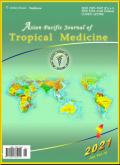Evaluation of parasitemia by qPCR in patients with chronic Chagas disease treated with benznidazole
IF 1.6
4区 医学
Q3 PUBLIC, ENVIRONMENTAL & OCCUPATIONAL HEALTH
引用次数: 0
Abstract
To evaluate parasitemia by qPCR in patients undergoing etiological treatment and followed in a Brazilian reference center. Parasite load was quantified by qPCR in 32 participants with chronic Chagas disease who were treated with benznidazole. Serological analyses were performed before and after the treatment and parasite loads were compared prior and 12/18 months post the treatment. Thirty-two participants were recruited and treated with benznidazole, and 20 were followed-up. Adverse events (AE) were observed in 22 out of 29 participants that had safety data (76%), and dermatological alterations were the most frequently observed AE. Of the 20 participants analyzed, 13 and 7 completed 12 and 18 months follow-up after the treatment, respectively. 12 Months after the final treatment, Trypanosoma cruzi was detectable in 3 patients by qPCR; 18 months after the final treatment, Trypanosoma cruzi was detectable per qPCR in 4 of the 7 participants. Thus, between 12 and 18 months, 7 participants of the 20 initial follow-up cases showed positive qPCR, indicating treatment failures. qPCR can be used as an alternative method for evaluating the effectiveness of the etiological treatment of CD, and can be applied to analyze early therapeutic failures. The study showed that benznidazole therapy had limited effectiveness in treating chronic CD patients, thus emphasizing the importance of conducting continued research for developing more effective therapies and diagnosis for CD.通过 qPCR 评估接受苯并咪唑治疗的慢性南美锥虫病患者的寄生虫血症
通过 qPCR 对接受病原学治疗并在巴西参考中心接受随访的患者的寄生虫血症进行评估。 通过 qPCR 对 32 名接受苯并咪唑治疗的慢性南美锥虫病患者的寄生虫量进行量化。在治疗前后进行了血清学分析,并比较了治疗前和治疗后 12/18 个月的寄生虫数量。 该研究招募了 32 名参与者,并对他们进行了苯并咪唑治疗,其中 20 人接受了随访。在有安全性数据的 29 名参与者中,有 22 人(76%)出现了不良反应(AE),皮肤病改变是最常见的不良反应。在分析的 20 名参与者中,分别有 13 人和 7 人完成了治疗后 12 个月和 18 个月的随访。最终治疗 12 个月后,3 名患者通过 qPCR 检测到了克鲁斯潘诺虫;最终治疗 18 个月后,7 名参与者中有 4 人通过 qPCR 检测到了克鲁斯潘诺虫。因此,在 12 至 18 个月期间,20 例初次随访病例中有 7 例出现了 qPCR 阳性,表明治疗失败。qPCR 可作为评价 CD 病因治疗效果的替代方法,并可用于分析早期治疗失败。该研究表明,苯并咪唑疗法对慢性 CD 患者的治疗效果有限,因此强调了继续研究开发更有效的 CD 治疗和诊断方法的重要性。
本文章由计算机程序翻译,如有差异,请以英文原文为准。
求助全文
约1分钟内获得全文
求助全文
来源期刊

Asian Pacific journal of tropical medicine
PUBLIC, ENVIRONMENTAL & OCCUPATIONAL HEALTH-TROPICAL MEDICINE
CiteScore
4.00
自引率
9.70%
发文量
1936
审稿时长
3-8 weeks
期刊介绍:
Asian Pacific Journal of Tropical Medicine (ISSN 1995-7645 CODEN: APJTB6), a publication of Editorial office of Hainan Medical University,is a peer-reviewed print + online Monthly journal. The journal''s full text is available online at http://www.apjtm.org/. The journal allows free access (Open Access) to its contents and permits authors to self-archive final accepted version of the articles on any OAI-compliant institutional / subject-based repository.
APJTM aims to provide an academic communicating platform for international physicians, medical scientists, allied health scientists and public health workers, especially those of the Asia-Pacific region and worldwide on tropical medicine, infectious diseases and public health, and to meet the growing challenges of understanding, preventing and controlling the dramatic global emergence and re-emergence of infectious diseases in the Asia-Pacific.
The journal is proud to have an international and diverse editorial board that will assist and facilitate the publication of articles that reflect a global view on tropical medicine, infectious diseases and public health, as well as emphasizing our focus on supporting the needs of public health practitioners. The APJTM will allow us to seek opportunities to work with others who share our aim, and to enhance our work through partnership, and to uphold the standards of our profession and contribute to its advancement.
 求助内容:
求助内容: 应助结果提醒方式:
应助结果提醒方式:


